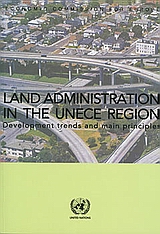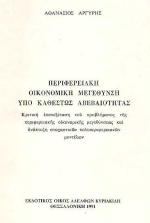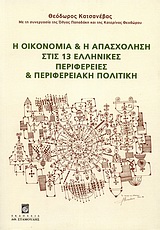
Land Administration in the UNECE Region
Land Administration in the UNECE Region
Development Trends and Main Principles
Present land administration systems need re-engineering, they must continually evolve to cope with the ongoing developments. To ensure that land administration and management decisions are consistent with sustainable development principles, land information systems must integrate a wider range of data, information and knowledge. The spatial information systems should become increasingly open and public from the highest level of government to the community level, as the societal knowledge bank upon which public and private sectors decisions are made becomes more complex.
In creating an efficient land administration system the policy issues should be addressed first. Policies must ensure equal access to real property to all people of both urban and rural society. The process for formalizing and subsequently transferring property rights should be as simple and efficient as possible.
Policy goals can not be achieved unless there is an effective land administration infrastructure with modern information technology providing effective citizen access to information. This infrastructure also includes organizations, standards and technological processes, as well as laws and regulations for property rights, valuation and taxation. These regulations should be transparent and meet local requirements and needs.
The present publication is a further contribution of UNECE in the ongoing process of improving land administration systems in the region. It takes into account the developments that have taken place since the publication in 1996 of the Guidelines on Land Administration. I hope that this study will lead to a better understanding of the interrelationship between good governance, civil society and land administration for sustainable development.
Brigita Schmognerova
Executive Secretary
| Έκδοση | Αθήνα, Τεχνικό Επιμελητήριο Ελλάδας, 1η έκδοση, 2005 |
| Μορφή | Βιβλίο |
| Θέματα | Περιφερειακός προγραμματισμός Ευρωπαϊκή Ένωση |
| Φυσική περιγραφή | 104σ., Μαλακό εξώφυλλο, 29x21εκ. |
| Τιμή | € 10.0, (Τελ. ενημ: 2006-04-05) |
| Διαθεσιμότητα | Κυκλοφορεί - Εκκρεμής εγγραφή |
| LEADER | 22 4500 | |
| 001 | 103508 | |
| 005 | 20200905011449.300 | |
| 041 | 0# | |a ελληνικά |
| 082 | 14 | |a 338.9 |a 382 |2 23 |
| 245 | 10 | |a Land Administration in the UNECE Region |b Development Trends and Main Principles |
| 250 | ## | |a 1η έκδοση |
| 260 | ## | |a Αθήνα |b Τεχνικό Επιμελητήριο Ελλάδας |c 2005 |
| 300 | ## | |a 104σ. |b Μαλακό εξώφυλλο |c 29x21εκ. |
| 520 | ## | |a Development Trends and Main Principles |
| 650 | #1 | |a Περιφερειακός προγραμματισμός |
| 650 | #1 | |a Ευρωπαϊκή Ένωση |
| 903 | ## | |a €10.0 |
| Τίτλος | Land Administration in the UNECE Region / ; |
| Έκδοση | Αθήνα, Τεχνικό Επιμελητήριο Ελλάδας, 1η έκδοση, 2005 |
| Μορφή | Βιβλίο |
| Θέματα | Περιφερειακός προγραμματισμός Ευρωπαϊκή Ένωση |
| Φυσική περιγραφή | 104σ., Μαλακό εξώφυλλο, 29x21εκ. |

























